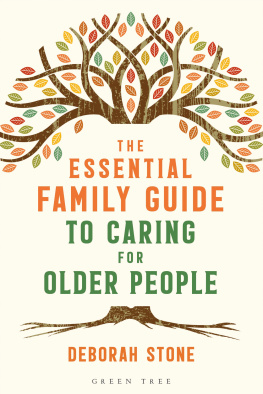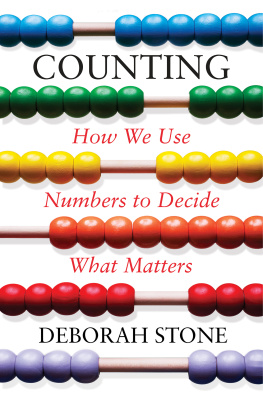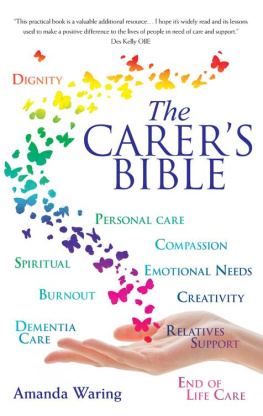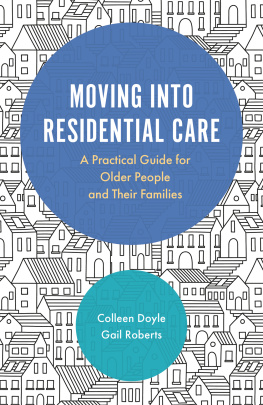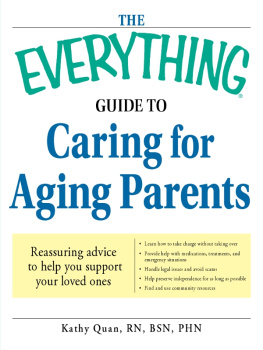To my father and mother

Contents
Writing this book has entailed enormous amounts of research and I would like to thank and acknowledge the following people and resources:
Carers Trust, www.gov.uk, www.lgo.org.uk, Age UK, Citizens Advice, HMRC, Society of Later Life Advisers (SOLLA), www.nhs.uk, Pension Wise, Money Advice Service, UKHCA, CQC, Julia Hart, Stella Nash, Sammy Margo, Alan Nevies, Gary Tatham, www.cot.co.uk, The Reiki Association, British Heart Foundation, Royal Voluntary Service, Arthritis Care, Arthritis Research UK, Bowel Cancer UK, Beating Bowel Cancer, Bladder & Bowel Community, Julian Kurer, Diabetes UK, Anchal Prasher, Parkinsons UK, Prostate Cancer UK, Stroke Association, Rebecca Penzer, Dementia UK, Alzheimers Society, Alzheimers Research UK, Anxiety UK, Mind, Huntingtons Disease Association, Dying Matters and the National Association of Funeral Directors.
I would also like to thank my husband, two sons and George Stone.
Caring for someone we love as they get older and become less independent is one of the most emotionally and physically challenging things that anyone will ever have to do.
This task is made all the more difficult because it is sometimes thrust upon us by a sudden event, such as a stroke, a fall, or the diagnosis of a long-term condition, and when we are at our most vulnerable and are emotionally fragile the system makes things worse by its complexity, and the seemingly impenetrable bureaucracy that surrounds it.
Many people come to this strange new world of health and social care without any experience of how to navigate the system, and with no knowledge of what questions to ask, or what choices to make.
Deborah Stone was faced with this scenario and has used the experience of supporting her parents to help and support other people going through similar challenges.
The Essential Family Guide to Caring for Older People is a clear, simple guide to a very complex process. All aspects of supporting older people are to be found in this incredibly comprehensive and useful publication.
This book is a practical guide to steering a course through a health and social care system that is increasingly focused on trying to stop older people getting services. What I find particularly useful is that the book can be used in every step of the journey. It covers clearly and comprehensively the assessment system, how you make informed choices about what care services to use and the responsibilities of local government, the NHS and the individual. All are clearly outlined and the book can be used as a reference manual as you move through the different choices you have to make.
One of the important aspects of this book is that it was written by somebody who has had practical experience of the challenges of supporting someone you love. As well as being a guide to the system, it helps people to understand that they are not alone, and Deborah shares her knowledge and experience in a way that gives practical help, and better understanding of the emotional challenges of caring.
I hope that anybody who has older relatives will read this, as it will enable you to navigate a complex system with much greater ease and deliver better outcomes for the people you love and all those who care for them.
Professor Martin Green OBE
Chief Executive: Care England
Chair: The International Longevity Centre-UK
I understand what it is like to care for an older relative. My father suffered from vascular dementia for over eight years and my family and I struggled to find the right information and care to help him. At the same time, I was running my own business, my husband travelled a great deal and I had two young children to look after, as well as running my home. I was constantly stressed, and often ill as a result.
My mother is still alive and has lived alone now for 16 years, but suffers from a range of complicated ailments and is barely able to walk. There are often emergency hospital admissions and unforeseen crises to deal with, which have ranged from drinking surgical spirit and potassium permanganate instead of cough mixture on two separate occasions to getting stuck in the shower one morning and breaking her pelvis in three places as she tried to open the door. There are some even more gruesome examples, which I have decided to spare you.
How I would have loved to have had a manual to guide me through the minefield of caring for my relatives, both now and earlier; one which covered all of the main issues I needed to know about, and which could have pointed me in the right direction to obtain further information. More importantly, I would have liked something that might have reassured me that I was doing my best, even when, quite often, I really felt that I was failing. But it did not exist, so I decided to write one and here it is! So I do hope that you will find this book useful as a guide to help you care for your older relatives.
I have written this book for family carers of older people, but it is just as useful for you if you are an older person yourself. Carers range widely in age from people in their 40s, right through to their 90s. They can be sons, daughters, nieces, nephews and very often, spouses and partners.
These days it is hard to define what older actually means, as so many people look and feel great well into their 70s, 80s and 90s. The official statistics, however, define older as post-pensionable age, i.e. 65+, and then make a further distinction above the age of 80. I hope that whatever your age and circumstances, you will find this book an invaluable resource to help you through the later life challenges we all face. It will guide you through the essential elements of planning ahead for financing care, sorting out legal issues and reviewing care options, as well as providing many helpful tips and suggestions about living a full and happy later life, as well as what to do when ill health and crises strike.
How to use this book
This book is a manual for you to use as often as you need to. You can dip in and out of it, depending on what information and advice you are looking for. If you do read it from cover to cover, you may find that some topics arise more than once, such as care assessments or certain family issues, but this is because particular sections demand that these issues be discussed as part of that particular topic. However, in other instances, the book will direct you to another page for fuller details on a subject, which might be mentioned in passing at a particular point in the book. If in doubt, you can find references to everything in the index.
Our population is ageing faster every year and, as a result, more and more of us are caring for older family members. Currently, around 18 per cent of people in the UK are aged 65 and over, and 3 per cent are aged 85 and over. In eight years time, one fifth of the UK population will be aged 65 or over, and this will rise to a quarter of the total population (19 million people) by 2045. The overall percentage of people over 80 is also growing rapidly and will see a fourfold increase in the 50 years from 2000 to 2050. The United Nations estimates that, by 2050, the over-80 age group will number almost 379 million worldwide, about 5.5 times as many as in 2000. By way of comparison, in 1950, there were fewer than 14 million people aged over 80 worldwide.
While it is good news that people are generally living longer, unfortunately many people live longer in ill health, often coping with a number of different illnesses and ailments. This places enormous stress in terms of time, money and emotional commitment on the millions of carers who help them. There are around 11 million direct and indirect carers in the UK and three in every five people will be carers at some point in their lives. One in five people aged between 50 and 64 are carers in the UK. Forty-two per cent of carers are men and 58 per cent are women. The current economic value of the contribution made by carers in the UK is 132 billion a year. By 2030, the number of carers will increase by 3.4 million. Many people are caring for someone with dementia. There are currently 800,000 people living with dementia in the UK, with 670,000 unpaid carers looking after them.

